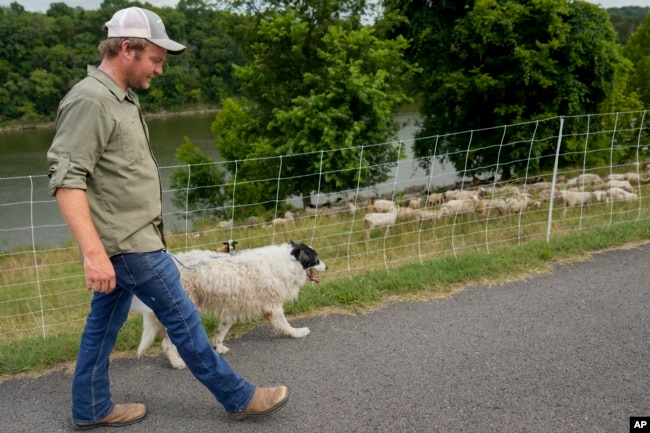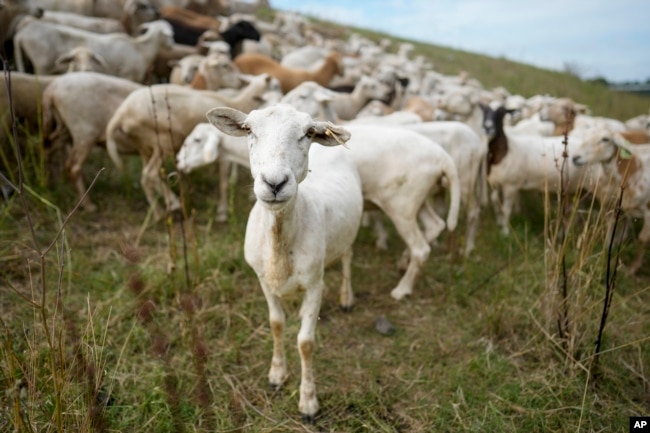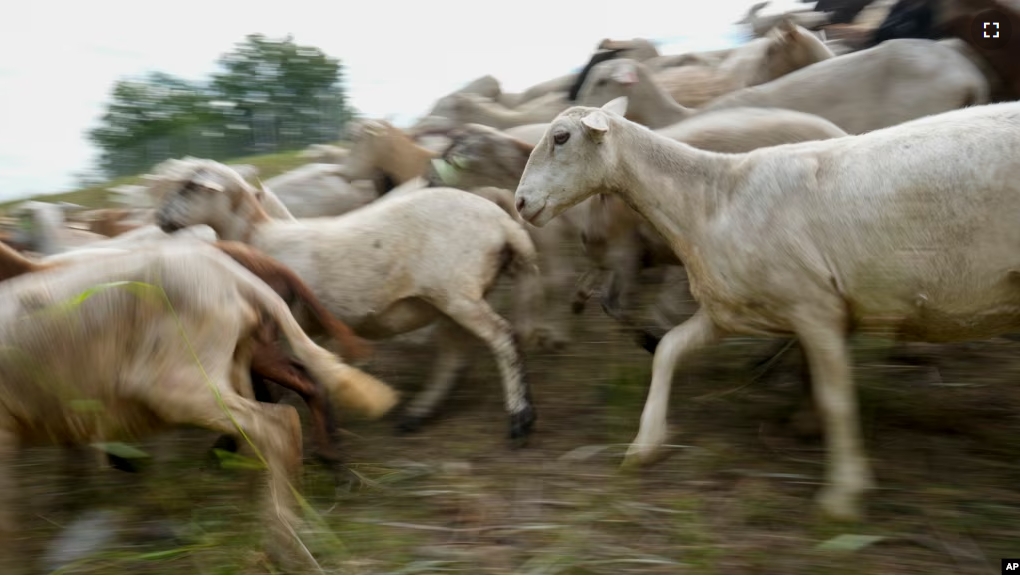Some American communities and universities have been experimenting with sheep and goats to keep plant growth under control.
Along the Cumberland River near Nashville, Tennessee, visitors on boats watch the large buildings of the city in the distance. But they also can see something few expected: hundreds of sheep eating grass, or grazing, along the river.
Sheep to remove unwanted plants
Zach Richardson oversees the sheep. His business is called Nashville Chew Crew. Richardson said sometimes the boats will go out of their way to let passengers get a closer look at his sheep. The group of sheep can be seen grazing a few hundred meters away from places where many people live and work.
The joy people get from watching sheep eat is partly why the creatures are becoming popular workers in some urban areas.
“Everybody that comes out here and experiences the sheep, they enjoy it more than they would someone…with a leaf blower or a weed eater,” Richardson said.
Using sheep to control plants is not a new method. But more American communities are choosing sheep to deal with problems such as invasive species, wildfire risks, native plant protection, and to keep historic places in good condition.
In 2017, Nashville’s parks department paid for the Chew Crew to control unwanted plant growth at Fort Negley. The Union Army built the fort during the U.S. Civil War. Unwanted plants, or weeds, were growing between and along its stones. Tools like lawnmowers could easily damage the stones.
Sheep now graze in an area of about 61 hectares of city property yearly, including in the historic Nashville City Cemetery.
Jim Hester is assistant director of Metro Nashville Parks. Speaking about the sheep, he said, “It is a more environmentally sustainable way to care for the greenspace and oftentimes is cheaper than doing it with handheld equipment and staff.”

Dogs watch over the Chew Crew’s sheep. The dogs spend their whole lives with the sheep and keep visitors and animals from getting too close. The group of sheep, or flock, is made up of hair sheep, a kind of animal that naturally releases its hair fibers and is often used for meat.
Santa Barbara fire protection
Santa Barbara, California, has been using sheep for about seven years to protect land buffers that can slow or stop the spread of wildfires.
“The community loves the grazers and it’s kind of a great way of community engagement,” said Monique O’Conner, open space planner for the city’s parks and recreation.
The grazed areas can change how fire moves, said Mark vonTillow, the wildland specialist for the Santa Barbara City Fire Department.
VonTillow said that, if a fire hits a grazed area, “The fire behavior reacts drastically and drops to the ground.” He added, “That gives firefighters a chance to attack the fire.”
Some universities have tried using goats and sheep on their properties. In 2010, weeds were overtaking an area at the University of Georgia that was not used by students or staff. The weeds were pushing out native plants, said Kevin Kirsche, the school’s director of sustainability.
Rather than using chemicals or mowers, Kirsche said the university hired Jennif Chandler to send in a herd of goats.
“Bringing the goats to the site was an alternative means of removing invasive plants in a way that was nontoxic to the environment and friendly to people,” Kirsche said.
At the time, Richardson, the owner of Chew Crew, was a student at the University of Georgia studying landscape architecture. He got the idea to create his own goat grazing business. The goats became the most popular four-legged creatures on campus, he said.

Richardson, who moved his company to Nashville after finishing his studies, now prefers sheep over goats. Sheep have closer group ties and are not as likely as goats to climb and explore.
“I’ll never own another goat,” he admitted. “It’s like trying to fence in water.”
But sheep are not an answer for all cities and their lands, O’Conner said. “We want to educate the public on why we’re choosing to graze where we’re grazing,” she added.
Hundreds of sheep can affect the environment by spreading seeds. The city of Santa Barbara does environmental studies before bringing in grazers since the process can also affect birds.
“Throwing like 500 sheep into an area is a much larger impact on the land and those soils than our native herbivores would have,” O’Conner said.
I’m Ashley Thompson.
And I’m John Russell.
Kristin M. Hall reported on this story for the Associated Press. John Russell adapted it for VOA Learning English.
______________________________________________
Words in This Story
leaf blower –n. a machine that uses a fan to blow away leaves
weed eater –n. a machine that cuts soft plants and grass
species – n. a class of individuals having common attributes and designated by a common name
sustainable – adj. of, relating to, or being a method of harvesting or using a resource so that the resource is not depleted or permanently damaged
staff –n. a regular employee
buffer – n. any of various devices or pieces of material for reducing shock or damage due to contact
drastically – adv. severely or seriously
herd –n. a name for groups of certain animals such as cattle, sheep and goats
alternative – adj. offering or expressing a choice
impact – n. a significant or major effect
herbivore –n. an animal that only eats plants
